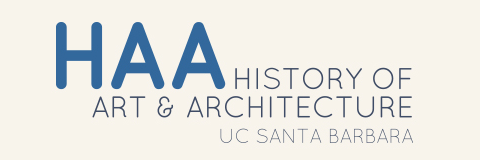react/review journal

react/review  is an annual peer-reviewed responsive journal produced by graduate students from the department of the History of Art & Architecture at UC Santa Barbara dedicated to research by emerging scholars in art and architectural history and related fields. Each issue takes its theme from the yearly spring symposium organized by UCSB History of Art & Architecture graduate students. Conference presenters who deliver outstanding papers are then invited to contribute feature articles, subject to peer review, to an upcoming issue. In keeping with the discursive spirit promoted by the symposium, react/review is a responsive journal in which feature articles are followed by brief critical responses by editors. This dynamic format aims to engage our readers and develop conversations that began at the symposium.
is an annual peer-reviewed responsive journal produced by graduate students from the department of the History of Art & Architecture at UC Santa Barbara dedicated to research by emerging scholars in art and architectural history and related fields. Each issue takes its theme from the yearly spring symposium organized by UCSB History of Art & Architecture graduate students. Conference presenters who deliver outstanding papers are then invited to contribute feature articles, subject to peer review, to an upcoming issue. In keeping with the discursive spirit promoted by the symposium, react/review is a responsive journal in which feature articles are followed by brief critical responses by editors. This dynamic format aims to engage our readers and develop conversations that began at the symposium.
Volume 1  , Volume 2
, Volume 2  , Volume 3
, Volume 3  , Volume 4
, Volume 4  and Volume 5
and Volume 5  are available on eScholarship
are available on eScholarship  . The call for papers for Volume 6, "Imagining the Local" is now open and submissions must be submitted no later than August 29. 2025. For more information, visit Submission Guildlines
. The call for papers for Volume 6, "Imagining the Local" is now open and submissions must be submitted no later than August 29. 2025. For more information, visit Submission Guildlines  .
.
Read "The Beauty of Publishing"  to learn more about react/review (Jim Logan, "The Beauty of Publishing," The Current, UC Santa Barbara, Tuesday, April 19, 2022, 9:00 AM).
to learn more about react/review (Jim Logan, "The Beauty of Publishing," The Current, UC Santa Barbara, Tuesday, April 19, 2022, 9:00 AM).
General inquiries can be sent to reactreviewjournal@gmail.com  .
.
AHGSA Symposium
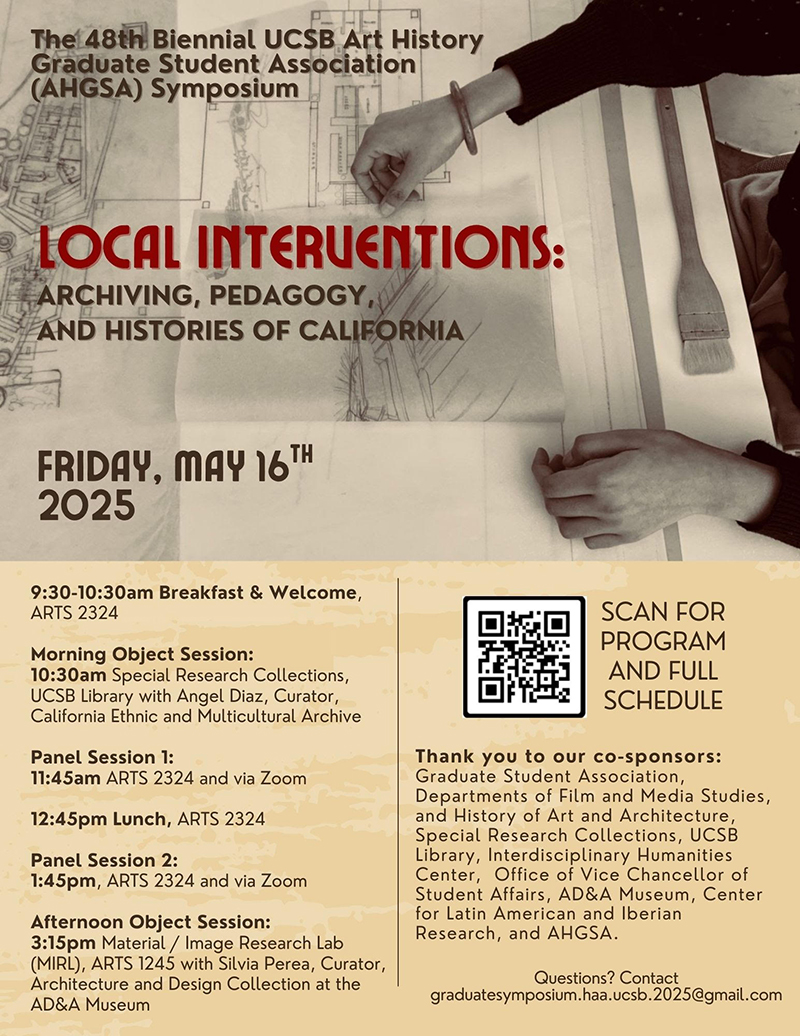
The 48th Biennial UCSB Art History Graduate Student Association (AHGSA) Graduate Symposium
Local Interventions: Archiving, Pedagogy, and Histories of California
Friday, May 16, 2025, 9:30 AM - 5:30 PM
Registration highly encouraged for morning and afternoon object sessions, please use the link here.
Panel sessions will be held in person and accessible remotely via Zoom. To join on Zoom, register at https://ucsb.zoom.us/meeting/![]() .
.
Schedule
| Time (PST) | Event | Location |
| 9:30 - 10:30 AM | Breakfast and Welcome: Alida Jekabson, Nathan Segura and Dhaval Chauhan | ARTS 2324 |
| 10:30 - 11:30 AM | Object Session 1: California Ethnic & Multicultural Archives (CEMA) object session with curator Angel Diaz | Special Research Collections, UCSB Library |
| 11:45 AM - 12:45 PM | Panel Session 1: Process, Interpretation, and Archival Practice | ARTS 2324 and via Zoom |
| 12:45 - 1:45 PM | Lunch break | ARTS 2324 |
| 1:45 - 2:45 PM | Panel Session 2: Spatial and Temporal Reconsiderations of the Archive | ARTS 2324 and via Zoom |
| 2:45 - 3:15 PM | Break | ARTS 2324 |
| 3:15 - 4:30 PM | Object Session 2: Architecture and Design Collection (ADC) object session with curator Silvia Perea | Material / Image Research Lab (MIRL), ARTS 1245 |
| 4:30 - 5:30 PM | Closing remarks and reception | ARTS Courtyard |
Thank you to our Co-Sponsors:
Graduate Student Association, Departments of Film and Media Studies and History of Art & Architecture, Special Research Collections, UCSB Library, Interdisciplinary Humanities Center, Office of the Vice Chancellor of Student Affairs, Art, Design & Architecture Museum, Center for Latin American and Iberian Research.
Program
10:30 - 11:30 AM Object Session 1: Special Research Collections, UCSB Library
Angel Diaz, Curator, California Ethnic & Multicultural Archives, UCSB
An Introduction to California Ethnic & Multicultural Archives (CEMA) at UCSB Library
Established in 1988, CEMA was one of the first ethnic-focused archival collecting initiatives within a California university library. CEMA is a permanent program that advances scholarship in ethnic studies through its varied collections of primary research materials. These unique collections document the lives and activities of African Americans, Asian/Pacific Americans, Chicanos/Latinos, and Native Americans in California. The collections represent the cultural, artistic, ethnic, gender, and racial diversity that characterizes the state's population.
Presentation will be followed by object viewing.
Claudia Grego March, PhD Candidate, UCSB Department of History of Art & Architecture
From California’s Grassroots to U.S. Chicanx Canon: Archival Politics and ICAA’s Latinx Papers Project
Over the past decade, efforts to establish a canon of 20th-century Chicanx art have become prevalent among art historians through the publication of monograph series on Chicanx artists, edited volumes of selected art critics’ papers, and anthologies of primary source documents. Joining this trend, the International Center for the Arts of the Americas (ICAA) at the Museum of Fine Arts in Houston launched the Latinx Papers Project in 2024. Aiming to elucidate the critical contributions of Latinx artists, including Chicanx, to U.S. art histories, ICAA’s project involves a significant expansion of their renowned Documents of Latin American and Latino Art digital platform with Latinx archival materials. This presentation will address how the Latinx Papers Project, through a targeted selection of documents from key repositories, focuses on the preservation and dissemination of primary source materials critical to the field of Chicanx art while also contributing to the canonization of specific artists and critics. By assessing my research for the ICAA project at UCSB’s California Ethnic & Multicultural Archives as the grassroots stage of canon formation, I will examine the politics of inclusion, contradictions, challenges, and contextual and ideological factors that may be involved in the contemporary consecration of Chicanx art in California.
11:45 AM - 12:45 PM Panel Session 1: Process, Interpretation, and Archival Practice, ARTS 2324 and via Zoom
Moderated by Kendall Lovely, PhD Candidate, UCSB Department of History
Dr. Meranda Roberts, Visiting Professor, Department of Art History, Pomona College
Curating Continuity: Cahuilla Basket Weaving, Institutional Memory, and Indigenous Collaboration
This presentation reflects on the process of curating Continuity: Cahuilla Basket Weavers and their Legacies at the Benton Museum of Art at Pomona College, an exhibition grounded in Indigenous methodologies and shaped through close collaboration with California Native artists, knowledge holders, and community members. Dr. Meranda Roberts will discuss how these partnerships informed every stage of the exhibition, honoring matrilineal traditions while challenging the colonial frameworks that have long defined the interpretation of Native material culture. The talk will also consider how the Benton’s collection — anchored by historic Cahuilla baskets — became a site of connection, reflection, and repair.
Alida Jekabson, PhD Student, UCSB Department of History of Art & Architecture
Encounters at the Intersection of Taste, Commerce, and Research: California Collectors of the Arts of the Ancient Americas
This presentation aims to situate and contextualize a collection of ancient and colonial objects from the Andes, donated in 1966 to the AD&A Museum at UCSB by the descendants of California-based botanist Thomas Harper Goodspeed (1887-1966), within broader histories of collecting the Arts of the Ancient Americas in California. The Goodspeed collection consists of ancient textiles and ceramics, as well as colonial paintings that he encountered during his many trips to Peru and Chile during his fieldwork in the region during 1930s and 40s. Goodspeed’s collecting tastes reflect his academic research and interests as a scientist, but few records exist in the AD&A Museum about the acquisition and provenance of these objects. Examining his academic archive and personal writings is a means to further understanding the role that California-based collectors played in fomenting the arts of the ancient Americas in institutions across the state, and intersection of this collecting work with personal tastes and commercial interests. This case study will be compared with other institutional initiatives to provide greater scholarly awareness and access to the role that California collectors played in shaping the canon of arts of the ancient Americas, particularly the Stendahl archive at the Getty Research Institute. The varying levels of access and availability to archives of California-based collections has led to patterns of increased scholarly attention around a single collector or institution, demonstrating how the promotion of open access archives contributes to the historiography of collecting.
1:45 - 2:45 PM Panel Session 2: Spatial and Temporal Reconsiderations of the Archive, ARTS 2324 and via Zoom
Moderated by Kristin Yinger, PhD Student, UCSB Department of History of Art & Architecture
Reilly Clark, PhD Student, UCSB Department of History of Art & Architecture
Abalone Futurism: Iridescent Art in Native California
In recent years, art historians and museum professionals have sought alternative relationships between human beings and the more-than-human world. “Abalone Futurism: Iridescent Art in Native California” explores the role of abalone shells in contemporary Native American art on the West Coast. The essay argues that abalone (Haliotis) is uniquely well-suited as a material to imagine new, decolonial futures for artists, scholars, and museums. Unlike most of the scholarly literature on abalone, which is largely anthropological, archaeological, and scientific in nature, this talk focuses on Native Californian life, cultural revitalization, and resistance through the lens of contemporary art and museum practice. First, the essay establishes the use of iridescent abalone shells on the West Coast before European contact. Next, it traces the transformation of abalone with European colonization and missionization. This talk considers abalone cultural objects that have been returned from anthropology collections to descendent communities as part of larger repatriation frameworks. It also considers abalone artworks that remain in mission museums. Finally, this talk explores the role of Haliotis in contemporary art installations and museum interventions. For Tongva artist, Mercedes Dorame, abalone connects past, present, and future. Dorame’s 2023 Getty commission, appropriately titled Woshaa’axre Yaang’aro (Looking Back) uses Haliotis as a materialization of Native Californian history. Likewise, Chicana artist Sandy Rodriguez uses abalone in her 2023 biombo enconchado (folding screen with shell), Mapa of Resistance & Revolt of Central Califas. The artist uses the iridescent material as a crystallization of California history and Indigenous survivance. This talk follows contemporary artists using abalone as a prism for Native California, a refractive medium of its pasts and its possibilities, a lens for looking forward while looking back.
Carrie Gammell, Doctoral Candidate in Architecture at the University of California, Los Angeles
Housing Histories: Auto-construction in Benedict Canyon, 1868–1904
In a 2021 retrospective of Wallace Neff’s long and prolific career as a residential architect, historian Eleanor Schrader praised him for “[his] ability to combine Spanish, Tuscan, Mediterranean, Islamic, and other design elements [...] seamlessly into something he called ‘The California Style.’”1 In the 1920s and 1930s Neff gained recognition from his celebrity commissions—including but not limited to Pickfair (1924), a mansion for actors Mary Pickford and Douglas Fairbanks; Misty Mountain (1926), a mansion for film director Fred Niblo and actress Enid Bennett; the Vidor King and Eleanor Boardman House (1928); and the Fredric March House (1934). Many of these estates were located in the picturesque Benedict Canyon, a luxury Beverly Hills neighborhood with mature trees and winding streets.
Benedict Canyon’s premier status as a celebrity enclave belies its humble origin as a homesteading colony: In the 1920s and ‘30s its lots sold for upwards of $5,000 per acre, but in the 1860s and ‘70s its lands were so undesirable that the federal government gave them away for free. The Art, Design & Architecture Museum at the University of California Santa Barbara hosts an archive of Neff’s work, which is integral to Southern California’s canon—a canon shaped more by the industrial wealth of Hollywood elites than by the agricultural enterprise of migrant workers. Yet, Benedict Canyon was named by and for Edson A. Benedict, a farmer whose family settled there in 1868 and remained there until 1925. Visual records of his and his neighbors’ auto-constructed houses may or may not exist, but written descriptions of them certainly do. This paper uses these written descriptions to reconstruct and recenter Benedict County’s earliest residences in Southern California’s architectural history. It argues that although these residences were designed and built by and for non-professionals, they, too, are integral to the region’s turn-of-the-century imaginary.
Faye Dowling, University of Arizona
Towards a psycho-geographical landscape: place, trace, and the photographic archive
The phenomenon of place as posited in Edward Relph’s 1976 Place and placelessness mapped our lived environments as cognitive sensory experiences. Through the lens of cultural cartography our inhabited landscapes can be considered psychodynamic planes, aligned through a constellation of geographic and temporal junctures. The photographic image too is not a static entity. Traces of each photograph – composed, printed, and observed, run dynamically through our social and historical imaginations. My research examines formative relations of landscape and identity in the American Southwest, and furthermore engages the spectral framework of hauntology as an applied historicocritical methodology through which to activate the a-temporality of the photograph as a revenant mapping object. My presentation will explicate these entwined methodologies within photographic discourse and present an experimental case study; a psycho-geographical mapping of Tulare Lake, California, a potent site imbued with the imprints of colonial and ecological historiographies, which reveal nature too, as revenant.
3:15 - 4:30 PM Object Session 2: Architecture and Design Collection (ADC) object session with curator Silvia Perea, Material / Image Research Lab (MIRL), ARTS 1245
Silvia Perea, Curator, Architecture and Design Collection, AD&A Museum, UCSB
From Collections to Collectives
In this presentation, Dr. Silvia Perea will examine the opportunities and challenges inherent in the acquisition and stewardship of architectural archives, with particular emphasis on the recent donation of the Kendrick Bangs Kellogg papers to the Architecture and Design Collection (ADC) at the AD&A Museum. She will provide a comprehensive overview of the acquisition process, as well as the subsequent treatment, organization, cataloging, and scholarly research undertaken to render the archive publicly accessible. These efforts are being carried out through the collaborative involvement of multidisciplinary teams, including students and subject-matter experts. Additionally, Dr. Perea will introduce a pioneering imaging initiative currently under development, utilizing selected materials from the Kellogg archive. The ADC’s Reference Archivist and the 2025 Digital Intern will also contribute to the presentation by discussing their roles in the implementation of this project.
Presenter Profiles
Object Session 1
Angel Diaz (she/her/ella) is the Curator for the California Ethnic & Multicultural Archives (CEMA) at the University of California Santa Barbara Library. In this role, she carries out work related to collection development, relationship building and maintenance, liaising with ethnic studies departments, education, and outreach for historical documents and creative works that represent communities of color in California. Angel received her MLIS for UCLA, as well as a MA in Teaching and BA in US History from the University of San Francisco.
Claudia Grego March is a Ph.D. candidate in the History of Art & Architecture department at the University of California, Santa Barbara. She earned a Master’s in Literary Theory from the École Normale Supérieure in Paris and a Master’s in Art History from the Sorbonne University. She specializes in twentieth-century Latin American and European art, and her dissertation examines the solidarity art networks between Cuba, Chile, and Spain during the Francoist dictatorship, with special consideration of the Hispanic colonial legacy. She has received several grants and fellowships, including the La Caixa Postgraduate Fellowships Abroad, the Graduate Humanities Research Fellowship, and the Albert & Elaine Borchard European Studies Fellowship for Dissertation Research. Additionally, she has been a scholar in residence at the Institute for Studies on Latin American Art in New York and has recently held a position as a field researcher for the International Center for the Arts of the Americas. Her work has been published in journals such as the Journal of Catalan Studies and Artl@s Bulletin.
Panel Session 1
Dr. Meranda Roberts, a citizen of the Yerington Paiute Tribe and Chicana, is a scholar, curator, and educator dedicated to reshaping how Indigenous histories are represented in museums and cultural institutions. She holds a Ph.D. in History and an M.A. in Public History from the University of California, Riverside. Her work centers Indigenous methodologies and anti-colonial practices to challenge harmful institutional narratives and promote meaningful collaboration with Native communities.
Meranda served as co-curator at the Field Museum of Natural History, where she contributed to the development of Native Truths: Our Stories. Our Voices, a permanent exhibition highlighting contemporary Native voices. In 2023, she curated Still We Smile: Humor as Correction and Joy at Idyllwild Arts, exploring Indigenous humor as a tool of resistance. She also guest-curated Continuity: Cahuilla Basket Weavers and their Legacies at the Benton Museum of Art at Pomona College, a show honoring the intergenerational artistry of Cahuilla women.
Her most recent exhibition, Eternal Testament, co-curated with Shinnecock artist Jeremy Dennis, opened at The Church in Sag Harbor, NY. The exhibition reclaims space and affirms Indigenous presence and sovereignty in the Hamptons. Meranda is a visiting professor in the art history department at Pomona College and serves on the Scholarly Advisory Committee for the forthcoming Smithsonian American Women’s History Museum.
Alida Jekabson is a PhD student in the History of Art & Architecture at the University of California, Santa Barbara (UCSB). Jekabson holds an MA in Art History and Curatorial Studies from Hunter College at the City University of New York, and a BA in History of Art from Bryn Mawr College. Her research focuses on histories of American modern art and craft in commercial and institutional spaces, such as world’s fairs and museums. She also examines how Latin American modernism and the ancient arts of the Americas were represented and circulated in these same venues, particularly in relation to U.S. diplomatic and cultural narratives during the twentieth century. Jekabson’s current project examines twentieth-century sites of textile consumption in U.S. public and private settings to explore themes of national and international altruistic concerns that drove the production and consumption of these textiles.
Jekabson has presented her research nationally and internationally at CAA and the Association for Art History, among other academic conferences, and has published her work in visual studies journals through the Vrije Universiteit, Amsterdam, and the University of Heidelberg. She is currently preparing a chapter and serving as co-editor for an upcoming anthology on the subject of craft and war, to be published with an academic press. Prior to beginning doctoral studies, Jekabson was a Curatorial Assistant at the Museum of Arts and Design in New York, where she provided curatorial support for exhibitions and collections work related to modern and contemporary craft and design.
Panel Session 2
Kristin Yinger (she/her) is a second-year PhD student in the History of Art & Architecture and the current AHGSA co-chair for 2024-2025. Her research focuses on 20th and 21st century American art, with interests ranging from 1970s feminist alternative arts magazines and collaborative artistic practices to photography and arts education. Prior to enrolling at UCSB, Yinger taught literature, media arts, and AP Art History courses at the high school level in Los Angeles for 7 years. Yinger received her M.A. in the History of Art from the Courtauld Institute of Art and her B.A. in Print and Digital Journalism, with a minor in Art History, from the University of Southern California.
Reilly Clark is an art historian studying repatriation, restitution, and museum practice at the University of California, Santa Barbara. Reilly earned his B.A. and M.A. in Art History at Stanford University, where he focused on modern and contemporary Indigenous art. He also studied at the University of Oxford, where he specialized in repatriation. Reilly has professional experience in repatriation, appraisals, museums, conservation labs, and archaeological sites as well as academic research.
Carrie Gammell is a doctoral candidate in Architecture at the University of California, Los Angeles, working at the intersection of architectural history, property law, and political economy. Her research focuses on claims, investments, and intermediary organizations in the United States, from the Homestead Act of 1862 to the Housing Act of 1934.
Carrie is also a Senior Research Associate at cityLAB-UCLA, where she studies state appropriations for California community college student housing. In the past, she contributed to Education Workforce Housing in California: Developing the 21st Century Campus, a report and companion handbook that provides a comprehensive overview of the potential for land owned by school districts to be designed and developed for teachers and other employees.
Prior to beginning her doctoral studies, Carrie worked as an architectural designer in Colombia and the United States, where she built a portfolio of affordable housing, multi-family residential, and single-family residential projects as well as civic and cultural renovations and additions. She holds a Bachelor of Architecture from Rice University and a Master in Design Studies (Critical Conservation) from the Harvard Graduate School of Design.
Faye Dowling is British scholar and curator studying art history at the University of Arizona, Tucson. Faye received her bachelor’s from Central St. Martin’s College of Art & Design, UK. She has practiced as an adjunct professor at University of the Arts, London, and as independent curator and editor with institutions including Somerset House, London, Kunst (Zeug) Haus, Switzerland, and Museum of Art & History, Brussels.
Object Session 2
Silvia Perea is an architect (M.Arch), Ph.D., and Curator of the Architecture and Design Collection at the AD&A Museum (University of California, Santa Barbara). Dr. Perea holds an International Doctorate in Architecture with Honors from the Polytechnic University of Madrid (UPM) and a Certificate in Museum Studies from Harvard University. Throughout her career, Dr. Perea has combined teaching and publishing with the organization of exhibitions. Dr. Perea has taught at international universities, including Columbia (NY), CEPT (India), Blas Pascal (Argentina), and the UPM (Spain). She has also published extensively, working as an editor of Arquitectura Viva, and contributing articles to magazines such as Domus, Architectural Record, Potlatch, Minerva, and Arquitectura, among others. As a curator, Dr. Perea has organized over a dozen exhibitions of art and architecture for American and European museums. Her curatorial practice advocates the integration of both disciplines as a means to enrich their respective discourses and perspectives.
Past Symposia
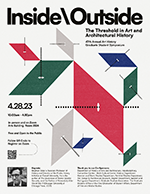 The 47th Annual Academic Symposium: Inside\Outside: The Threshold in Art and Architectural History
The 47th Annual Academic Symposium: Inside\Outside: The Threshold in Art and Architectural History
Friday, April 28, 2023 | In-person and on Zoom, Arts Building, Room 2324 | 10:00 AM – 4:30 PM
The Symposium Keynote Speaker was Stephan Victor, Assistant Professor of History and Director of the Public History Initiative at Cornell University and the program included three panel discussions of graduate presenters. Click here to view the Symposium program and presenter profiles ![]() .
.
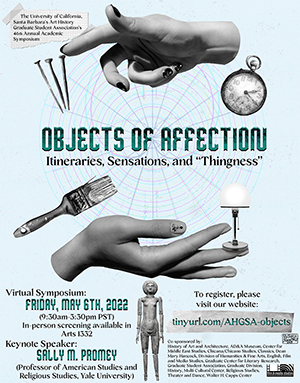 The 46th Annual Academic Symposium: Objects of Affection: Itineraries, Sensations, and "Thingness"
The 46th Annual Academic Symposium: Objects of Affection: Itineraries, Sensations, and "Thingness"
Friday, May 6, 2022 | Online, with in-person screening in Arts 1332 | 9:30 AM – 3:30 PM
This symposium's keynote address given by Sally M. Promey, Professor of American Studies and Religious Studies at Yale University and the program included three panel discussions of graduate presenters. This year's theme, more specifically, asked participants to examine human engagements with the art, cultural, and/or religious object to consider more broadly how objects can accumulate affective value by their movement and display. Click here to view the Symposium program and presenter profiles ![]() .
.
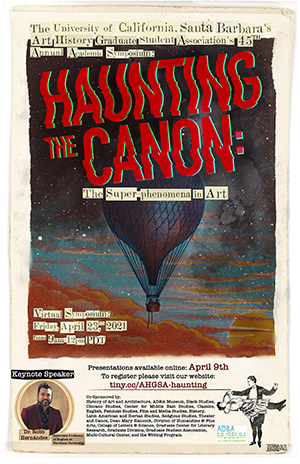 The 45th Annual Academic Symposium: Haunting the Canon: The Super-phenomena in Art
The 45th Annual Academic Symposium: Haunting the Canon: The Super-phenomena in Art
Friday, April 23, 2021 | Online | 9:00 AM – 12:00 PM
This symposium was held virtually on Zoom, with a keynote address given by Robb Hernández, Associate Professor of English at Fordham University. The speakers’ pre-recorded papers were available two weeks prior to the event and shared with registrants. The virtual symposium included the keynote presentation and facilitated discussions on the papers, allowing the audience to ask questions live. Click here to view the Symposium program and presenter profiles ![]() .
.
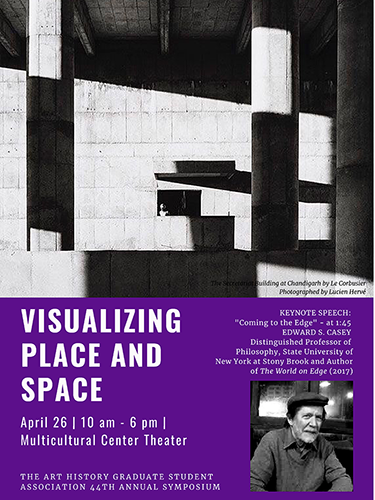
The 44th Annual Academic Symposium: Visualizing Place and Space
Friday, April 26, 2019 | Multicultural Center Theater | 10:00 AM – 6:00 PM
The keynote address was from Edward S. Casey, Distinguished Professor of Philosophy, SUNY Stonybrook. The symposium theme focused on how the visual arts both represent and shape experiences by influencing how we perceive the environment as it is situated physically, intellectually and affectively, and papers explored theories and models of space and place in art, design, craft, architecture and other visual forms of communication. Click here to view the Symposium program ![]() .
.
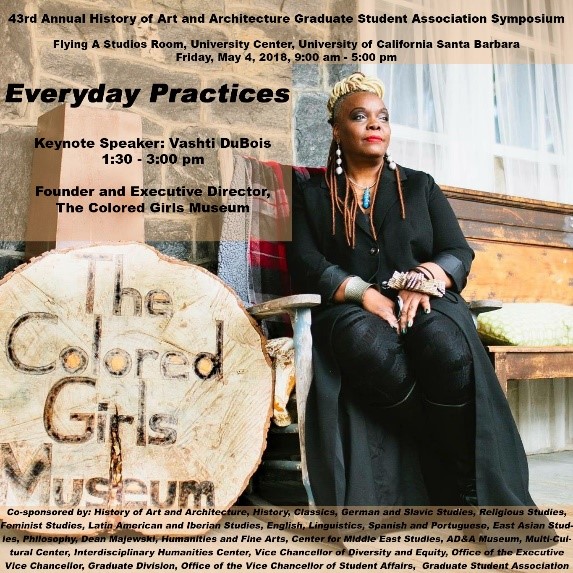 The 43rd Annual Academic Symposium: Everyday Practices
The 43rd Annual Academic Symposium: Everyday Practices
Friday, May 4, 2018 | Flying A Studios Room, University Center (UCen) | 9:00 AM – 5:00 PM
Vashti DuBois, Founder and Executive Director, The Colored Girls Museum, gave the keynote address. The theme argued that when art and architectural historians overlook the everyday in favor of grand and canonical narratives, the significance of the ordinary is often lost. This symposium aimed to reclaim the nuance and allusive nature of everyday life by addressing the mundane, the vernacular, the mass-disseminated, and other ordinary narratives.
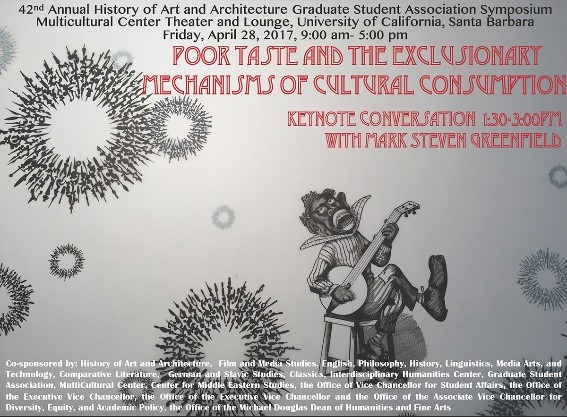 The 42nd Annual Academic Symposium: Poor Taste and the Exclusionary Mechanisms of Cultural Consumption
The 42nd Annual Academic Symposium: Poor Taste and the Exclusionary Mechanisms of Cultural Consumption
Friday, April 28, 2017 | Multicultural Center Theater and Lounge | 9:00 AM – 12:00 PM
Keynote Speaker was LA-based artist and curator Mark Steven Greenfield. The symposium aimed to facilitate an interdisciplinary discussion on the ways in which taste includes and excludes across a diverse set of historical, cultural and political contexts. Click here to view the Symposium program ![]() .
.
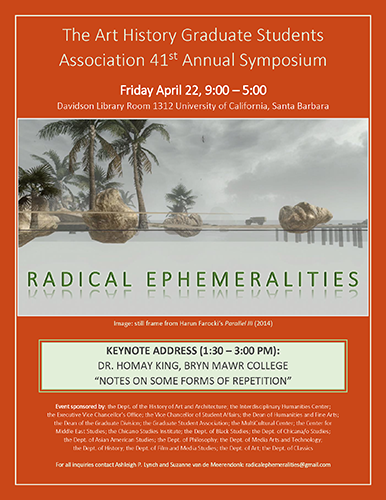 The 41st Annual Academic Symposium: Radical Ephemeralities
The 41st Annual Academic Symposium: Radical Ephemeralities
Friday, April 22, 2016 | Davidson Library, Room 1312 | 9:00 AM – 5:00 PM
The keynote address was from Homay King, Bryn Mawr College, SUNY Stonybrook. The symposium asked scholars and artists to address: how the concept of ephemerality might be analyzed in different historical and political contexts, how can ephemera be recovered or preserved, how has (art) historical inquiry shifted in response to changes in both the accessibility and nature of data, and how have our disciplines adapted to diminishing attention spans and/or the need for interactivity. Click here to view the Symposium program ![]() .
.
